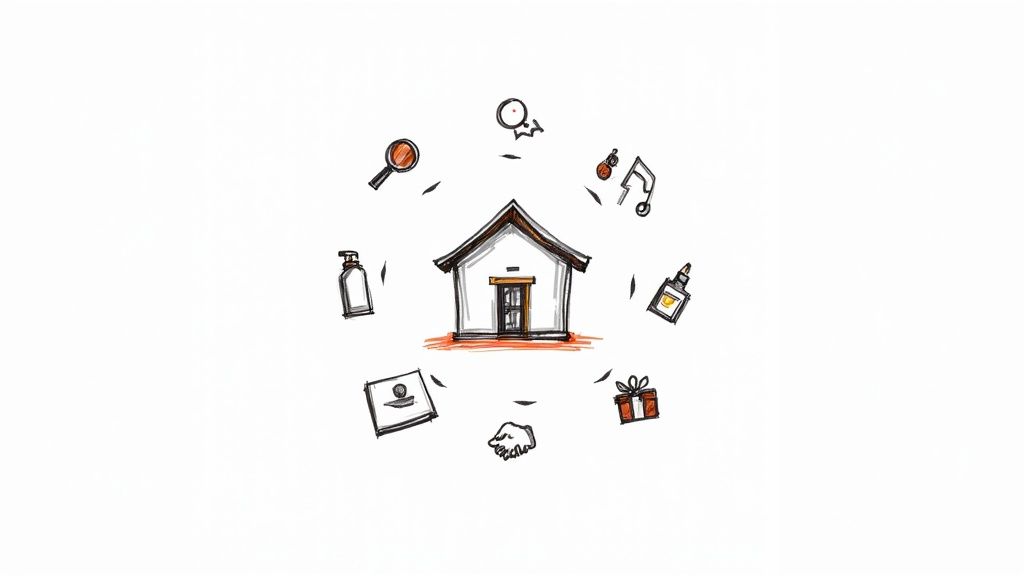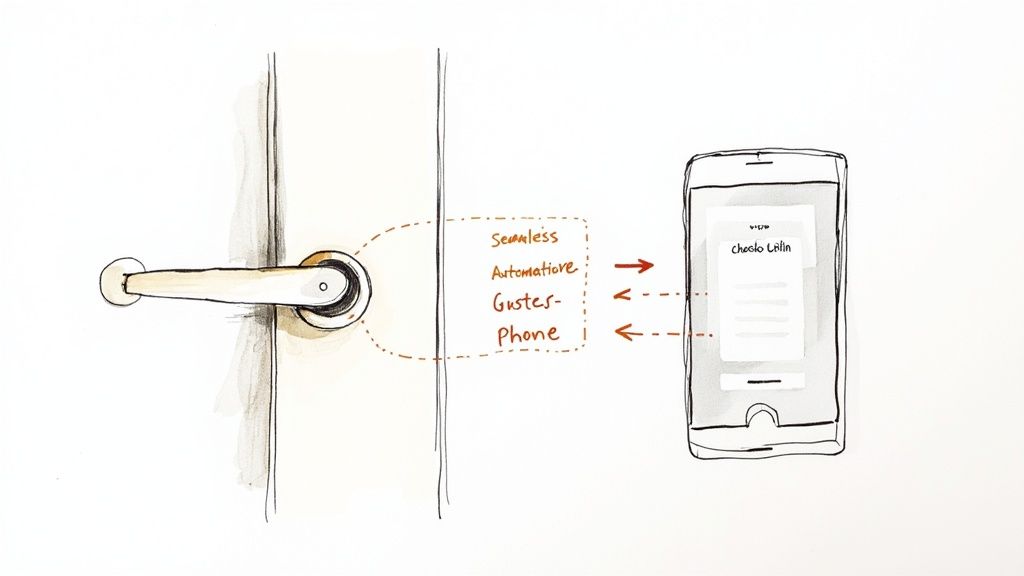
tips on hosting airbnb
8 Essential Tips on Hosting Airbnb for Success in 2025
Posted on Oct 3, 2025

The world of short-term rentals is more competitive than ever. Standing out requires more than just a spare room; it demands a strategic approach that blends hospitality, marketing, and operational excellence. Whether you're a new host looking to get started or a seasoned property manager aiming to scale, mastering the fundamentals is key to maximizing your income and achieving consistent 5-star reviews. This guide moves beyond generic advice to provide actionable, proven strategies to elevate your listing from average to exceptional.
We will provide a comprehensive roundup of the most effective tips on hosting Airbnb, designed to give you a competitive edge. You'll learn how to optimize your listing for maximum visibility, implement a dynamic pricing model that adapts to market demand, and streamline your operations for efficiency and guest satisfaction. We'll also cover crucial topics like perfecting your cleaning protocols, building a Superhost reputation, and navigating local regulations to ensure long-term success.
By implementing these strategies, you will be well-equipped to increase your occupancy rates, secure glowing reviews, and build a sustainable, profitable hosting business. Let's explore the specific tactics that top-performing hosts use to unlock their property's full potential and create unforgettable guest experiences.
1. Create an Outstanding Listing with Professional Photos
In the visually-driven world of online travel, professional photography isn't an expense; it's the single most crucial investment you can make in your Airbnb business. High-quality images are the first thing potential guests see, directly influencing their decision to click on your listing or scroll past it. Data consistently shows that listings with professional photos can see booking rates increase by up to 40% and can command significantly higher nightly prices, making it one of the most effective tips on hosting an Airbnb for immediate impact.

This strategy works because professional photographers understand how to use lighting, composition, and staging to make your space look its absolute best. They highlight unique features, create a sense of spaciousness, and evoke a feeling of comfort and desirability that amateur photos rarely capture. For example, Superhosts frequently report a surge in inquiries and bookings immediately after upgrading their imagery, and luxury properties often add $50 to $100 per night to their rates based on a new photo portfolio alone.
How to Implement This Strategy
To get the most out of your photoshoot, follow these actionable steps:
- Declutter and Depersonalize: Remove personal items like family photos, mail, and excess clutter. Your goal is to create a clean, inviting canvas that allows guests to envision themselves in the space.
- Stage for Lifestyle: Don't just show an empty room. Stage it to tell a story. Place a book and a coffee mug on a nightstand, set the dining table for a meal, or arrange plush towels by the hot tub.
- Optimize Lighting: Schedule the shoot during the "golden hour" (just after sunrise or before sunset) for soft, warm, natural light. Open all blinds and curtains to make the space feel bright and airy.
- Capture Key Details: Include a mix of wide-angle shots to show the layout and close-up shots of unique amenities, decor, or architectural features that make your property special.
- Refresh Seasonally: Update your primary photos quarterly to reflect the current season. A snowy exterior in winter or a blooming garden in spring helps your listing feel current and relevant.
2. Optimize Your Listing Title and Description for Search
Beyond photos, your listing's title and description are the most powerful tools for capturing guest attention and ranking higher in Airbnb's search results. The platform's algorithm functions like a search engine, prioritizing listings that use relevant keywords and provide clear, comprehensive details. This is one of the most impactful tips on hosting an Airbnb because it directly improves your visibility without any financial investment, turning casual browsers into confirmed bookings by clearly communicating your property's value.

Strategic copywriting balances search engine optimization (SEO) with engaging, persuasive language. A title like "Downtown Loft Near Convention Center" will vastly outperform a generic one like "Beautiful Space" by attracting guests searching for that specific location. For instance, hosts in Austin who add "SXSW nearby" to their titles can see booking increases of over 200% during the festival. Similarly, properties that specifically mention "work-friendly setup" or "fiber internet" saw a surge in popularity as remote work became more common. Optimizing your listing text is a continuous process that adapts to travel trends and local events.
How to Implement This Strategy
To effectively optimize your listing's text and boost your search ranking, implement these steps:
- Be Specific in Your Title: Include the neighborhood, a key landmark, or a unique feature directly in your title. Use all 50 characters to provide as much compelling information as possible.
- Highlight Key Amenities Early: Place your most valuable amenities, like "Hot Tub," "Pet-Friendly," or "EV Charger," in the first few sentences of your description where they are most visible.
- Use Bullet Points: Break up long paragraphs of text by using bullet points or numbered lists to highlight amenities, house rules, and nearby attractions. This makes your listing easier to scan on mobile devices.
- Update for Seasonality: Tailor your description to upcoming seasons, holidays, or major local events. Mention "cozy fireplace for winter getaways" or "5-min walk to the Jazz Festival."
- Test and Analyze: Don't be afraid to A/B test different titles to see which one generates more clicks and bookings. Track your listing's performance and adjust your copy accordingly.
3. Implement Dynamic Pricing Strategy
Leaving your nightly rate static is one of the biggest financial mistakes a host can make. Implementing a dynamic pricing strategy, where rates adjust based on demand, seasonality, and local events, is a critical tip on hosting an Airbnb that directly boosts your bottom line. This approach ensures you aren't leaving money on the table during peak periods and remain competitive enough to secure bookings during lulls. Data from platforms like PriceLabs shows that hosts who adopt dynamic pricing can increase their annual revenue by up to 40%.

This strategy works because it aligns your pricing with real-time market value. For example, a property near a major sports stadium might see a 300% rate increase during a championship weekend, while a ski resort property could fluctuate from $100 per night in the off-season to over $500 during peak winter holidays. By automating this process with a dedicated tool or manually adjusting based on market data, you can maximize both occupancy and revenue throughout the year. For a deeper understanding of this powerful technique, you can explore comprehensive guides on vacation rental revenue management.
How to Implement This Strategy
To effectively deploy a dynamic pricing model, follow these actionable steps:
- Set Your Boundaries: Establish a firm minimum rate to cover costs and a maximum rate for high-demand dates. This prevents you from underpricing or pricing yourself out of the market.
- Plan for Local Events: Research conferences, festivals, and major events in your area 60-90 days in advance. Adjust your rates to capture this predictable surge in demand.
- Monitor Your Competition: At least once a week, analyze the pricing of similar listings in your area. Use this data to ensure your rates are competitive and accurately reflect your property’s value.
- Leverage Minimum Stays: During holidays or peak weekends, implement a two or three-night minimum stay. This maximizes revenue from high-demand periods and reduces turnover costs.
- Use Last-Minute Discounts: To fill unbooked nights, set up a rule to automatically apply a 10-20% discount for bookings made within two or three days of arrival. This helps convert last-minute shoppers and avoid lost income.
4. Perfect Your Check-in Process and Guest Communication
A seamless check-in and proactive communication system are foundational pillars of a 5-star guest experience. This strategy transforms the crucial first impression from a point of potential stress into a smooth, welcoming transition. By automating and refining this process, hosts can significantly reduce their workload while making guests feel informed, valued, and cared for from the moment they book. This is one of the most impactful tips on hosting an Airbnb because it directly influences reviews and reduces time-consuming guest questions.

This approach combines smart technology with thoughtful, timed communication to create a hotel-quality experience with a personal touch. For example, property management companies like Vacasa have perfected this by using smart lock systems from August or Schlage, which allow for secure, contactless entry at any hour. Furthermore, hosts who implement automated messaging and digital guidebooks through platforms like Hostfully often report a 40% reduction in routine guest inquiries, freeing them up to focus on enhancing the stay rather than answering repetitive questions.
How to Implement This Strategy
To create a flawless arrival experience and communication flow, follow these actionable steps:
- Automate Key Messages: Use Airbnb's scheduled messages or a third-party tool to send key information automatically. Send booking confirmation, check-in instructions 24 hours prior to arrival, a "hope you're enjoying your stay" message on day two, and a checkout reminder the night before departure.
- Implement Smart Lock Access: Install a reliable smart lock to provide guests with a unique, time-sensitive code. This eliminates the risk of lost keys and removes the need for in-person key handoffs, offering flexibility for late arrivals.
- Create a Digital Guidebook: Develop a comprehensive digital guide using a service like TouchStay. Include everything from Wi-Fi passwords and appliance instructions to local restaurant recommendations and emergency contact information, accessible on any device.
- Provide Video Walkthroughs: For properties with unique features or complex systems (like a smart home hub or hot tub), record a short, clear video walkthrough. This visual aid can prevent confusion and service calls.
- Establish Clear Channels: Let guests know the best way to reach you and your expected response time. Providing this clarity upfront builds trust and manages expectations effectively.
5. Focus on Cleanliness and Five-Star Amenities
In the competitive short-term rental market, exceptional cleanliness and thoughtful amenities are non-negotiable foundations for success. Post-pandemic, guest expectations for hygiene have skyrocketed, transforming a spotless space from a bonus to a baseline requirement. This focus is one of the most impactful tips on hosting an Airbnb because it directly influences reviews, guest satisfaction, and your ability to command premium rates. Properties participating in programs like Airbnb's 'Enhanced Clean' have seen booking rates increase by as much as 20%.
This strategy works because it addresses core guest needs for comfort, safety, and convenience. While a clean space is expected, going above and beyond with hotel-quality touches and thoughtful amenities creates a memorable experience that guests are eager to share in their reviews. For instance, providing high-thread-count sheets or a welcome basket with local snacks can easily justify a $50+ increase in your nightly rate. It’s these small, deliberate details that separate a standard stay from a five-star one. For more insights on this, you can explore comprehensive guides on managing a vacation rental property.
How to Implement This Strategy
To elevate your property's cleanliness and amenities, implement these actionable steps:
- Create a Detailed Cleaning Checklist: Document every single task, from wiping down light switches to sanitizing remote controls. This ensures consistency between turnovers, whether you clean yourself or hire a team.
- Invest in Quality Linens and Towels: Purchase commercial-grade, all-white linens and towels. They are durable, can be bleached for ultimate sanitation, and provide a crisp, luxurious hotel feel that guests appreciate.
- Provide "Forgot-at-Home" Essentials: Stock your space with items guests commonly forget, such as universal phone chargers, basic toiletries, and a first-aid kit. This small gesture demonstrates immense care and thoughtfulness.
- Schedule Regular Deep Cleans: Beyond routine tidying, incorporating professional strategies can elevate your property's appeal; follow these top carpet cleaning tips to maintain freshness and address wear and tear. This should also include tasks like cleaning behind appliances and washing window coverings.
- Add Hotel-Inspired Touches: Master simple techniques like professionally folded towels, fanned-out toilet paper rolls, and placing a small, sealed welcome snack on each pillow. These touches elevate the guest's arrival experience.
6. Build Your Superhost Status and Reviews
Achieving and maintaining Superhost status is more than just a badge on your profile; it's a powerful business driver that signals trust, quality, and reliability to potential guests. This elite designation provides significant platform advantages, including higher search ranking, increased visibility, and the coveted Superhost filter, which many guests use exclusively. The program is a cornerstone of the platform, designed to reward hosts who provide outstanding hospitality, leading directly to more bookings and higher revenue.
This strategy is one of the most effective tips on hosting an Airbnb because it leverages the platform's own reward system. Superhosts consistently earn more, with some data suggesting up to a 60% increase in earnings compared to regular hosts. The status is a direct result of excelling in four key areas: maintaining a high overall rating, achieving a low cancellation rate, a high response rate, and completing a minimum number of stays. This creates a positive feedback loop where excellent service leads to great reviews, which builds your Superhost status, which in turn attracts more bookings.
How to Implement This Strategy
To fast-track your journey to Superhost and maintain the status, focus on these critical actions:
- Respond Immediately: Aim to respond to all inquiries and booking requests within an hour, not just the 24-hour window. This not only satisfies the high response rate requirement but also impresses guests and increases booking conversion.
- Proactively Manage Reviews: Don't wait for issues to become negative reviews. Check in with guests mid-stay to ensure everything is perfect. After checkout, send a polite message thanking them for their stay and gently reminding them to leave a review of their experience.
- Never Cancel a Booking: Protect your cancellation rate at all costs. Only cancel in a true, verifiable emergency that falls under Airbnb's extenuating circumstances policy. A single avoidable cancellation can prevent you from earning Superhost status for an entire year.
- Solicit and Act on Feedback: Treat every piece of private feedback as a gift. Use guest suggestions to make continuous improvements, whether it's adding a new kitchen gadget or clarifying your check-in instructions. This demonstrates a commitment to excellence that guests notice and appreciate in public reviews.
7. Screen Guests Effectively and Set Clear House Rules
A proactive approach to guest screening and house rules is not about being restrictive; it's about protecting your investment and ensuring a five-star experience for everyone. This strategy acts as a crucial filter, attracting respectful guests who are a good fit for your property while deterring those who might cause issues. By setting clear expectations from the start, you minimize the risk of property damage, neighborhood complaints, and negative reviews, making this one of the most vital tips on hosting an Airbnb for long-term success.
This method works by establishing a framework of mutual respect before a guest even arrives. Clear, concise rules remove ambiguity and empower guests to be responsible, while a consistent screening process provides valuable insights into a potential booker's history. For instance, experienced hosts report that simply requiring a verified government ID can reduce problematic incidents by over 60%, and properties with explicit quiet hours and occupancy limits are far less likely to face noise complaints from neighbors.
How to Implement This Strategy
To effectively protect your property and attract the right guests, integrate these steps into your hosting routine:
- Require Verified Identification: Make Airbnb's government-issued ID verification a non-negotiable requirement for booking. This simple step adds a significant layer of accountability.
- Establish Clear, Concise Rules: Define your house rules clearly in your listing. Focus on key areas like noise levels (e.g., quiet hours from 10 PM to 8 AM), parties and events, unregistered guests, and smoking policies.
- Communicate Rules Proactively: Don't just list the rules; communicate them. Send a brief, friendly message with the key house rules after booking confirmation and display a physical copy in a prominent location within the property.
- Leverage Smart Booking Settings: Use Airbnb's "Instant Book" feature with filters that require guests to have positive reviews from other hosts and a verified profile, automating a part of your screening.
- Document Property Condition: Take time-stamped photos or videos of your property's condition before each check-in. This provides a clear baseline in the rare event of a dispute or damage claim.
8. Understand Local Laws and Optimize for Compliance
Navigating the complex and ever-changing landscape of short-term rental regulations is a non-negotiable aspect of professional hosting. Short-term rental laws vary dramatically by city, county, and even neighborhood, covering everything from licensing and taxes to zoning restrictions and safety standards. Proactively managing compliance is not just about avoiding fines; it’s a fundamental strategy for building a sustainable and legally sound Airbnb business, protecting your investment from the risk of shutdown or severe financial penalties.
This tip on hosting an Airbnb is critical because non-compliance can be catastrophic. For instance, San Francisco requires hosts to register and imposes fines up to $1,000 per day for violations, while strict regulations in New York City have led to the removal of thousands of listings. By contrast, markets like Savannah, GA, have created balanced frameworks that successful hosts navigate with ease. Staying informed and compliant ensures operational continuity, enhances your professional reputation, and prevents legal issues that could otherwise derail your business.
How to Implement This Strategy
To stay ahead of regulatory requirements and operate with confidence, follow these actionable steps:
- Consult with Experts: Engage a local attorney or consultant specializing in real estate and short-term rental law. Their expertise is invaluable for interpreting complex ordinances and ensuring your setup is fully compliant from day one.
- Join Local Host Associations: Become a member of local or national organizations like the Vacation Rental Management Association (VRMA). These groups provide timely updates on regulatory changes, offer advocacy, and connect you with a community of informed hosts.
- Automate Tax and Fee Management: Use your property management software (like Hostfully or OwnerRez) to automatically collect and remit the correct occupancy and tourism taxes. Allocate 10-15% of your revenue in a separate account specifically for taxes and licensing fees.
- Maintain Meticulous Records: Keep detailed records of all bookings, guest information, income, expenses, and communications related to compliance. This documentation is essential in the event of an audit or inquiry from local authorities.
- Build Positive Local Relationships: Introduce yourself to neighbors and consider building relationships with local officials. A positive community presence can be beneficial, especially in areas where regulations are actively being discussed or revised.
8 Essential Airbnb Hosting Tips Comparison
| Strategy | Implementation Complexity | Resource Requirements | Expected Outcomes | Ideal Use Cases | Key Advantages |
|---|---|---|---|---|---|
| Create an Outstanding Listing with Professional Photos | Moderate (requires staging and coordination) | $200-$800 for professional photography; time for setup and updates | Up to 40% higher booking rates; premium pricing | Hosts seeking to boost first impressions and bookings | Higher search ranking; reduced guest disappointment |
| Optimize Your Listing Title and Description for Search | Low to Moderate (requires ongoing updates) | Time for keyword research and copywriting | Improved search visibility; higher conversion rates | Hosts aiming to increase qualified inquiries and bookings | Clear guest expectations; better communication |
| Implement Dynamic Pricing Strategy | Moderate to High (learning curve with tools) | Monthly tool fees ($20-$100); ongoing monitoring | Revenue increase by 30-50%; higher occupancy | Hosts targeting revenue maximization via price adjustments | Automated pricing; data-driven decisions |
| Perfect Your Check-in Process and Guest Communication | Moderate (initial setup and tech integration) | $100-$300 for smart locks; time for automation setup | Higher guest satisfaction; reduced host workload | Hosts managing multiple properties or remote hosting | Professional guest experience; fewer issues |
| Focus on Cleanliness and Five-Star Amenities | Moderate to High (ongoing operational effort) | 15-25% of revenue on cleaning and supplies | Higher ratings and repeat bookings; premium pricing | Hosts emphasizing guest comfort and hygiene | Reduced negative feedback; Superhost eligibility |
| Build Your Superhost Status and Reviews | High (continuous commitment and responsiveness) | Significant time investment; rapid response required | 20-30% higher booking rates; priority in search | Experienced hosts seeking trust and credibility | Exclusive rewards; increased guest trust |
| Screen Guests Effectively and Set Clear House Rules | Moderate (requires administrative effort) | Time for screening, rule enforcement | Reduced property damage; better guest matching | Hosts focused on property protection and community relations | Legal protection; higher quality guest stays |
| Understand Local Laws and Optimize for Compliance | High (complex legal environment; ongoing updates) | Time for legal research; possible fees | Avoidance of fines; long-term operational sustainability | Hosts in regulated or high-risk jurisdictions | Legal peace of mind; community relationship building |
Transforming Your Hosting into a Thriving Business
The journey from simply listing a property to cultivating a thriving short-term rental business is built on a foundation of deliberate, strategic action. We've explored the essential pillars of success, moving far beyond basic hosting and into the realm of professional management. The actionable tips on hosting airbnb shared in this guide are not just a checklist, but a comprehensive framework for excellence.
From the visual power of professional photography that captures a potential guest's attention to the search-optimized listing that ensures they find you in the first place, every detail matters. Mastering these initial steps creates the funnel through which your future five-star reviews will flow. It's about building a compelling first impression that accurately reflects the quality of the stay you provide.
From Good to Great: The Operational Core
Once a guest is booked, the focus shifts to operational mastery. This is where good hosts become great.
- Dynamic Pricing: Implementing a smart pricing strategy isn't a "set it and forget it" task. It's an ongoing process of analyzing market trends, seasonality, and local events to maximize revenue and occupancy, ensuring you never leave money on the table.
- Seamless Communication: A flawless check-in process and proactive guest communication are the cornerstones of a stress-free experience. Automating key messages removes friction, answers questions before they are asked, and makes guests feel genuinely cared for from booking to checkout.
- Unwavering Standards: Impeccable cleanliness and thoughtful amenities are non-negotiable. These are the tangible elements that guests remember and mention in reviews. Consistently exceeding expectations in these areas is the most direct path to earning Superhost status and building a powerful, positive reputation.
Building a Sustainable and Scalable Business
Ultimately, transforming your hosting into a legitimate business requires a long-term perspective. This means diligently screening guests and enforcing clear house rules to protect your asset and your peace of mind. It also involves the critical, often overlooked, step of understanding and adhering to local laws and regulations, ensuring your operation is both compliant and sustainable.
The most important takeaway is that success in the competitive vacation rental market is an active pursuit. It involves continuous learning, adaptation, and a commitment to refining every aspect of your business. By embracing these advanced tips on hosting airbnb, you are not just managing a property; you are building a reputable brand, a reliable income stream, and a business designed for lasting success.
Ready to elevate your hosting game and automate your success? hostAI provides an all-in-one platform to implement these strategies seamlessly, from creating a direct booking website and managing email marketing to optimizing your pricing. Take control of your business and unlock your property's full potential by visiting hostAI today.